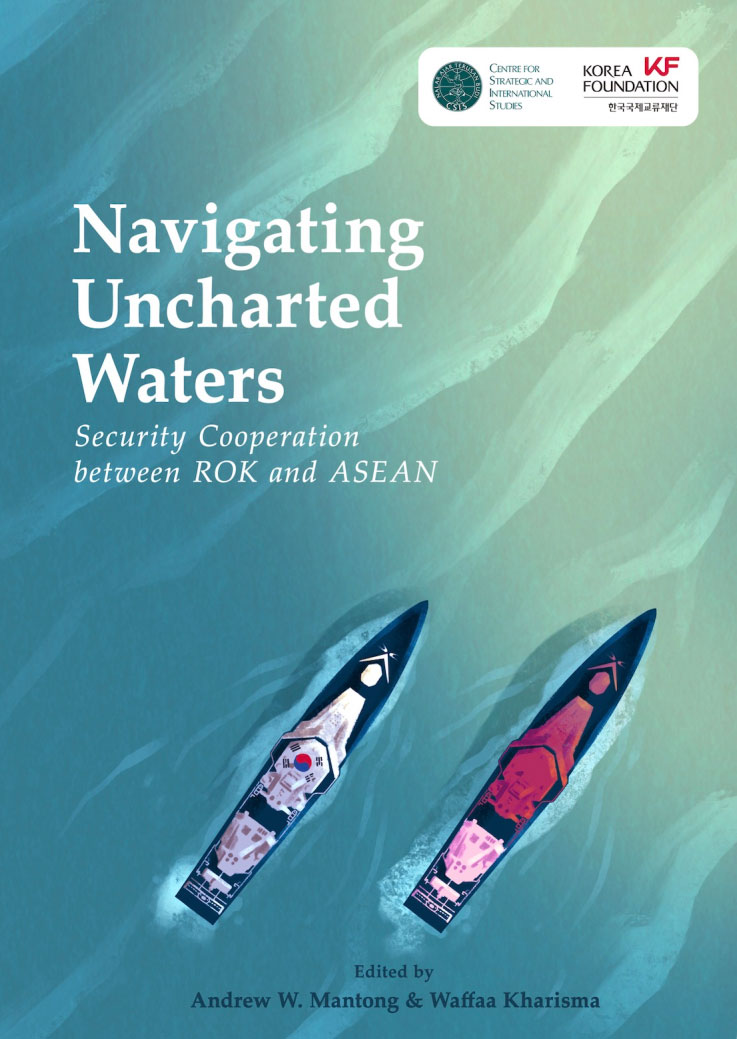 In the age of the Indo-Pacific marked by the coming proliferation of military competition, the notion of relevance and practicality may increasingly be associated with security cooperation. Yet despite the increased regional standing and elevation of ASEAN’s status in Korea’s foreign policy strategy, as well as the increasing regional demands and challenges that come from security issues, the Republic of Korea (ROK) continues to project a limited security role in Southeast Asia. This book caters to solving this policy gap through promoting a catalyst for furthering and deepening security cooperation between the ROK and ASEAN: boosting security cooperation between ROK and Maritime Southeast Asian countries.
In the age of the Indo-Pacific marked by the coming proliferation of military competition, the notion of relevance and practicality may increasingly be associated with security cooperation. Yet despite the increased regional standing and elevation of ASEAN’s status in Korea’s foreign policy strategy, as well as the increasing regional demands and challenges that come from security issues, the Republic of Korea (ROK) continues to project a limited security role in Southeast Asia. This book caters to solving this policy gap through promoting a catalyst for furthering and deepening security cooperation between the ROK and ASEAN: boosting security cooperation between ROK and Maritime Southeast Asian countries.
To examine the prospect of a greater ROK role in the region and the prospect of boosting security cooperation between ROK and Maritime Southeast Asian countries, this edited volume hosts several perspectives both from scholars of ROK and Maritime Southeast Asian nations. Each side presents their observations, ranging from national-level observations of security cooperation between ROK and a Maritime Southeast Asian nation as well as the regional-level observation of the impetus and challenges in proceeding with the idea.
The edited volume finds that, while convergences between security priorities between ROK and Maritime Southeast Asian countries remain limited, the relationship do not lack in common geopolitical outlook and similar ideals. Whilst different priorities reflect the homework left to be done, the ROK holds a big potential upon a specific security role for Southeast Asia. Why should ROK start from focusing on Maritime Southeast Asia? What would be such security role about?
This edited volume will be of interest to policymakers, analysts, and students who seeks to understand not only the specific policy issue of whether there is a prospect for a greater ROK role in Southeast Asia, particularly in security cooperation, but also in engaging a discussion on the crucial role of middle power collaboration in facing the incoming regional dynamics.
Muhammad Waffaa Kharisma
Researcher, Department of International Relations, Centre for Strategic and International Studies.
Andrew Mantong
Researcher, Department of International Relations, Centre for Strategic and International Studies.
Gilang Kembara
Researcher, Department of International Relations, Centre for Strategic and International Studies
Dr. Aaron Jed Rabena
Research Fellow, Asia Pacific Pathways to Progress(Philippines)
Dr. Nurliana Kamaruddin
Deputy Executive Director (Academic & Student Affairs), Universiti Malaya
Dr. Zokhri Idris
Chief Executive Officer, Policy and Economic Affairs Centre of Malaysia Foundation (PEACE)
Shawn Ho
Associate Research Fellow, S. Rajaratnam School of International Studies, Nanyang Technological University, Singapore
Dr. Kasira Cheeppensook
Deputy Director of the Centre for Social and Development Studies, Chulalongkorn University
Dr. Ha Anh Tuan
Assistant Director General of the East Sea (SCS) Institute, the Diplomatic Academy of Vietnam
Dr. Hoo Chiew Ping
Senior Lecturer, Universiti Kebangsaan Malaysia
Prof. Won Deuk Cho
Research Professor at the Institute of Foreign Affairs and National Security (IFANS), Korea National Diplomatic Academy (KNDA)
Dr. Jaehyon Lee
Research Fellow and Director of the Center for ASEAN and Oceania Studies, ASAN Institute for Policy Studies
Siu Tzyy Wei
Volunteer Research Associate, Global Awareness & Impact Alliance (GAIA)
Dr. Asyura Salleh
Co-Founder, Global Awareness & Impact Alliance (GAIA)
Hoang Thi Ha
Senior Fellow, ISEAS Yusof Ishak Institute
Published by:
Centre for Strategic and International Studies (CSIS)
Pakarti Centre
Jl. Tanah Abang III No. 23-27
Jakarta 10160
Indonesia
T: (62-21) 386 5532
F: (62-21) 384 7517
ISBN: 978-979-1295-45-1
November 2022
Last Update: 23/12/2022